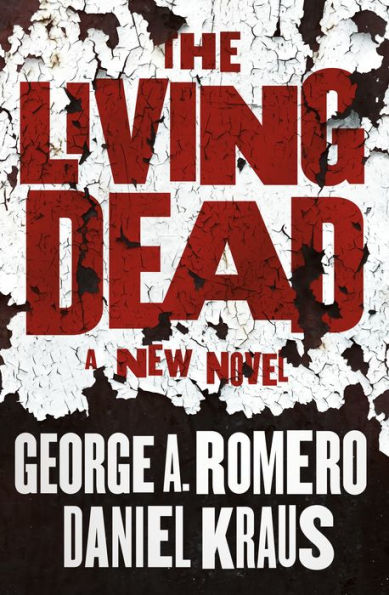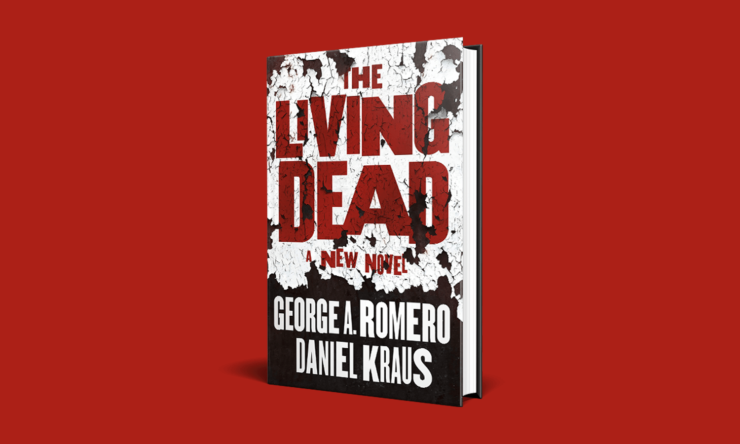The Living Dead (2020) is a full life’s work of undeath. It is the ultimate expression of George Romero’s vision, carefully curated, expanded andultimately—fulfilled by Daniel Kraus.
One of the most fascinating parts of the novel is Kraus’ afterword, explaining how The Living Dead came together and the decisions he made in writing it; it is an ode to collaboration that will be of interest to more than just publishing geeks. If anything, Kraus undersells his own contributions: Romero’s work, although visionary, is often self-contradictory and incomplete. Kraus pulls together fragments across media formats—and time—unites them, and extends them into a single, holistic narrative.
Ultimately—to skip to the end—The Living Dead will someday rest comfortably alongside other shelf-breaking epics. It deserves mention alongside The Passage, Swan Song and—dare I say it—The Stand, as examples of the sweeping, apocalyptic saga. In that sense, it is timeless: it is a novel that can function as the zombie apocalypse epic; not just ‘a’ or ‘another’ zombie book, but the zombie book that will serve as core text of the genre for future readers.
However, The Living Dead may be timeless, but it is not contemporary. And although it will serve an important role in the future, it faces undeniable challenges in the present. This incongruity comes down to two factors—one external to the text, and one within it.
Buy the Book


The Living Dead
The first, of course, is the inescapable reality that this is book about a pandemic during a pandemic. The existence, and impact of, Covid-19 is fundamentally unfair to The Living Dead (as it is to, well, everything else). It is, through no fault of the book itself, impossible to read The Living Dead without repeatedly drawing parallels with our own anxious reality.
A fantasy book (including supernatural horror) can provide either escape or perspective. Being a fantasy pandemic of exacerbated, splatterpunk proportions is no escape from reality—there’s little comfort to be found in reading about a virus that messily eats people. Nor does The Living Dead add new perspective to our present situation. The events of the book take place in a pandemic that is analogous, but not metaphoric.
If anything, Romero and Kraus’ assumptions of humanity’s response to a pandemic seem charitable. The Living Dead does not show humanity’s ‘better side’, by any means. And the future it foresees is gruesome and harrowing. But when the book describes humanity at its worst, we’re ‘only’ feral, rather than engaging in the amoral and profiteering behavior that we’ve seen in real life. Unlike reality, there’s no movement to question the apocalypses’ existence; the zombies are not a political issue; no one is shilling toxic zombie counter-measures for profit. In The Living Dead, those with bizarre, conspiratorial theories on the nature and origins of the pandemic are portrayed as monstrous outliers, while those who take advantage of the chaos for personal gain are unequivocally villains.
As a result, The Living Dead makes for an uncomfortable read during Covid. There are enough parallels to prevent the reader from fully escaping, but none, oddly enough, seem relevant enough to be provocative or engaging.
The Living Dead is also a book out of sync with contemporary readers for a second reason—this one intentional. As he describes in his afterword, Kraus chose to stay true to Romero’s vision as much as possible, even emulating the director’s famous refusal to use the word ‘zombie’ in his films. In 2020, however, the notion of the ‘zombie’ has gone past cult culture—past pop culture even—and is now firmly embedded in the mainstream. The term is now used frequently to refer to anything that hints of undeath or the eerie. As Marina Warner details it, ‘zombie’ has “become an existential term, about mental and physical enslavement, a deathly modern variation on the age-old theme of metamorphosis.” For example, CNN alone has referred to ‘zombie fires’, ‘zombie cicadas’, ‘zombie deer’, and urban landscapes ‘like zombie films’ in the past six months.
The Living Dead, however, starts from first principles—introducing them to a contemporary universe where they’re not firmly embedded in our cultural consciousness. It requires a tiny, but strangely challenging, suspension of disbelief. The Living Dead is set in a strange sort of alternate history—a universe without, ironically, George Romero.
The Living Dead also, as mentioned above, largely eschews the use of zombies as metaphor. In Romero’s first film, the zombies represent a ‘super-annuated white proletariat rising up’ (Warner again); inextricably linked to the context of Romero’s declining, post-industrial Pittsburgh hometown. Romero’s second, with its shopping mall setting, is now seen as one of the defining critiques of capitalism. The Living Dead, however, goes for scale over context—it takes place across a set of serialised events, with characters that occasionally brush against one another. The Living Dead plays out the full scope of the zombie apocalypse from its first seconds into the near future—it is saga, not scalpel, concerned with telling its own story, rather than providing commentary on any other.
The zombies themselves no longer represent anything, they simply are. Zombies, to quote Simon Pegg, are “the most potent metaphorical monster”, but The Living Dead intently focuses only on the latter. The book embraces, gleefully, the horrible physicality of the monster: delighting in wet gore and grasping, tearing violence. The Living Dead seeks to define the zombie: it introduces the living dead like the reader has never encountered them before; building on the assumption that their existence is, in and of itself, a surprise and a source of terror. Sometimes, to paraphrase Freud, a zombie is just a zombie, and, for The Living Dead, that is enough.
By remaining so loyal to a vision set out a half century ago, The Living Dead presumes a certain naïveté in the reader. Since 2000 alone, we’ve had—in roughly chronological order—fast-moving zombies, revisionist comedy zombies, Nazi zombies, steampunk zombies, Regency zombies, zombie detectives, zombie exercise apps, zombie romances, zombie soccer moms, zombie suburbia, and zombie teen romances. (Not to mention the cultural underpinning of the two most highly viewed shows in television history: The Walking Dead and A Game of Thrones, both of which feature—wait for—zombies.) The archetypical zombie—the Romero zombie—is unavoidably anachronistic. We can’t pretend that the zombie discourse hasn’t moved on: The Living Dead is released more or less simultaneously with the second instalment of a Disney musical zombie high school romcom.
The Living Dead, in many ways, the perfect first zombie book: the zombie thesis. It presents the notion of the living dead like it is a new idea, explores the fundamentals from a variety of (immensely entertaining) perspectives, and lays the groundwork for future, more incisive, uses of the trope. It so happens that many of those future uses have already occurred over the past fifty years, but that doesn’t mean The Living Dead can’t—or won’t—still serve as the formative text for future zombie readers. It is, as it is intended to be, the perfect encapsulation of, and companion to, Romero’s classic films, and will ultimately be, just as they are, timeless.
The Living Dead is available now from Tor Books.
Jared Shurin is the editor of The Djinn Falls in Love, The Outcast Hours, The Best of British Fantasy, and many other published and/or forthcoming works. He writes irregularly at raptorvelocity.com and continuously at @straycarnivore.










